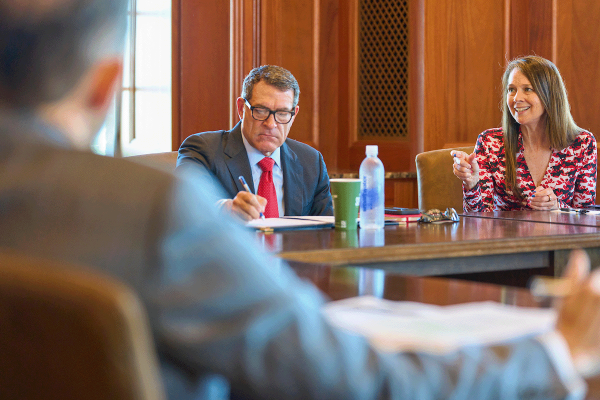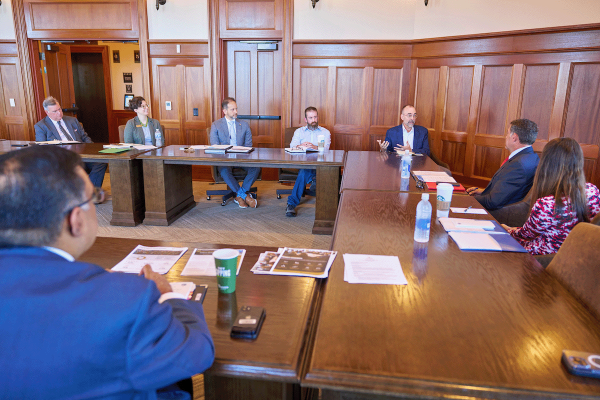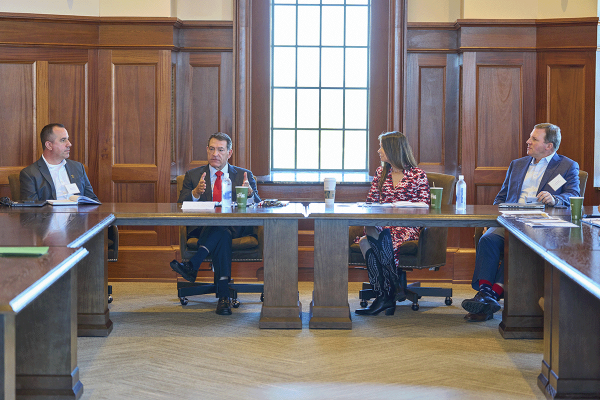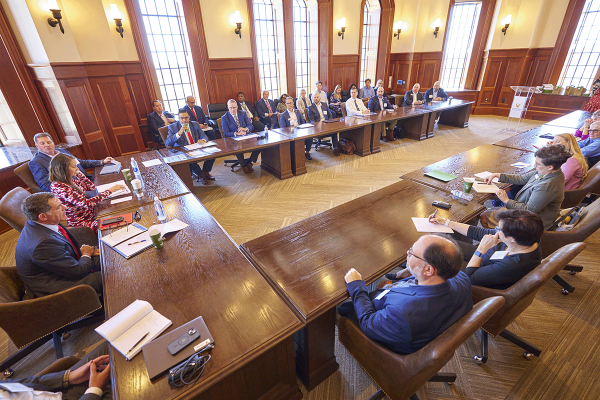Vanderbilt University’s Office of Federal Relations hosted U.S. Rep. Mark Green, R-Tenn., and Cybersecurity and Infrastructure Security Agency Director Jen Easterly on campus to talk about cybersecurity workforce shortages and the higher education cybersecurity ecosystem. The event brought together key figures to examine higher education’s vital role in national cybersecurity.
Green is chair of the House Committee on Homeland Security. At a recent hearing, Green highlighted the estimated workforce shortage of 500,000 cybersecurity professionals in the United States, which leaves critical infrastructure vulnerable. Addressing this shortage is his top concern, and he is working closely with Easterly and CISA, the federal government’s cybersecurity hub, to tackle the issue.
Green and Easterly are focused on workforce development, with the goal of ensuring that enough skilled professionals are prepared to fill the vacancies. They explored Vanderbilt’s cybersecurity initiatives and how the federal government can support these programs.
“America’s cybersecurity workforce gap is a significant homeland security risk—a vulnerability for criminals and our adversaries to exploit,” Green said. “The public and private sectors must join forces to bolster our cyber talent pipeline to develop, attract and retain the skilled professionals necessary to protect the critical infrastructure Americans rely on every day.
“Collaborating with institutions like Vanderbilt University, a Center of Academic Excellence in Cybersecurity Research, strengthens our collective defense and helps us build a more secure future.”
Doug Adams, executive director of the Vanderbilt Institute of National Security; Daniel F. Flowers, professor of engineering; Brett Goldstein, special advisor to the chancellor; and Alex Sevilla, vice provost for career advancement and engagement, highlighted the ways Vanderbilt is leading cyber workforce development through collaboration and innovation. The university has established a new college dedicated to computing, AI and data science, is launching the Vanderbilt Institute for National Security and recently announced the Nashville Innovation Alliance.
After that conversation, Vanderbilt held a roundtable discussion with Green and Easterly and higher education IT leaders from Nashville and surrounding areas. Led by Brett Sweet, chief financial officer and vice chancellor for finance and information technology, and Shane Callahan, chief information officer, the roundtable focused on the cyber threat landscape facing higher education institutions.
The leaders discussed shared challenges facing higher education and the importance of collaboration with federal agencies like CISA to enhance their cybersecurity posture. CISA shared valuable information on its current support for institutions of higher education.
“Nothing is more important than catalyzing trusted partnerships. So, everybody needs to understand the information we have—the no-cost services, the no-cost training—because we are here to help drive down risk to America,” Easterly said. “We are grateful for the opportunity, we’re grateful to Chairman Green for his leadership and partnership, and we are looking forward to working with this community to continue to keep Americans safe.”
The visit underscored the pivotal role of academic institutions in fortifying the nation’s cybersecurity infrastructure.
“Vanderbilt’s productive dialogue with federal leaders demonstrated a shared commitment to addressing workforce shortages and enhancing cyber resilience,” said Heather Bloemhard, director of federal relations. “Vanderbilt’s Office of Federal Relations continues to play a vital role in bridging the university’s initiatives with federal priorities, fostering partnerships that drive innovation and security.”



